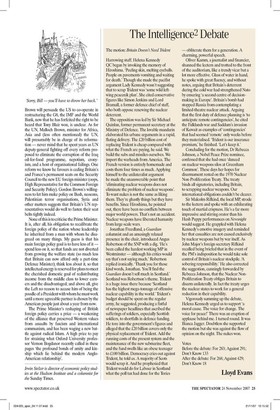The Intelligence2 Debate
The motion: Britain Doesn't Need Trident Harrowing stuff. Helena Kennedy QC began by invoking the memory of Hiroshima. 'Peeling skin, melting eyeballs. People on pavements vomiting and waiting for death.' Though she made the pacifist argument Lady Kennedy wasn't suggesting that to scrap Trident was 'some wild leftwing peacenik plan'. She cited conservative figures like Simon Jenkins and Lord Bramall, a former defence chief of staff, who both oppose renewing the nuclear deterrent.
The opposition was led by Sir Michael Quinlan, former permanent secretary at the Ministry of Defence. The lovable mandarin elaborated his urbane arguments in a rapid, fluting delivery. The £20 billion cost of replacing Trident is cheap compared with what the French are paying, he said. We build the subs and missiles ourselves. We import the warheads from America. The French version is entirely homemade and costs them four times as much. Applying himself to the unilateralist argument he made the unanswerable point that 'eliminating nuclear weapons does not eliminate the problem of nuclear weapons'. To want nukes is not the same as liking them. They're ghastly things but they have benefits. Since Hiroshima, he pointed out, there have been no conflicts between major world powers. That's not an accident. Nuclear weapons have liberated humanity from large-scale wars.
Jonathan Freedland, a Guardian columnist and an amusingly relaxed presence in the chair, introduced Angus Robertson of the SNP with a dig. 'He's been called the hardest working MP in Westminster — although his critics would say that's not saying much.' Robertson replied ironically. 'Thank you for those kind words, Jonathan. You'll find the Guardian doesn't sell much in Scotland.' Scotland was Robertson's theme. Trident is a huge issue there because 'Scotland has the highest mega-tonnage of offensive nuclear capability in the world.' Trident's budget should be spent on the regular army, he suggested, producing a fistful of newspaper headlines that ascribed the sufferings of soldiers, especially Scottish soldiers, to shortfalls in defence funding. He tore into the government's figures and alleged that the £20 billion covers only the physical replacement of Trident. Add the running costs of the present system and the maintenance of the new submarine fleet, and the fund swells like an obese teenager to £100 billion. Democracy cries out against Trident, he told us. A majority of Scots would scrap it. And he prophesied that Trident would do for Labour in Scotland what the poll tax had done for the Tories — obliterate them for a generation. A charming, powerful speech.
Oliver Kamm, a journalist and financier, shunned the lectern and trotted to the front of the auditorium, like a trendy vicar but a lot more effective. Glass of water in hand, he spoke with great fluency, and without notes, arguing that Britain's deterrent during the cold war had strengthened Nato by ensuring 'a second centre of decisionmaking in Europe'. Britain's bomb had stopped Russia from contemplating a limited-theatre nuclear attack. Arguing that the first duty of defence planning is 'to anticipate remote contingencies', he cited the Falklands war and Saddam's invasion of Kuwait as examples of 'contingencies' that had seemed 'remote' only weeks before they materialised. 'Trident is our insurance premium,' he finished. 'Let's keep it.'
Concluding for the motion, Dr Rebecca Johnson, a Nobel Peace Prize nominee, confessed that she had once 'danced on nuclear weapons silos at Greenham Common'. These days her hopes for disarmament rested on the 1970 Nuclear Non-Proliferation Treaty. The treaty binds all signatories, including Britain, to scrapping nuclear weapons. Our international obligations couldn't be clearer.
Sir Malcolm Rifkind, the local MB strode to the lectern and spoke with an exhilarating touch of martial crispness. He's a far more impressive and stirring orator than his Hush Puppy performances on Newsnight would suggest. He grappled with Helena Kennedy's emotive imagery and reminded her that casualties are not caused exclusively by nuclear weapons but by war itself. As John Major's foreign secretary Rifkind recalled being briefed that in the event of the PM's indisposition he would take sole control of Britain's nuclear stockpile. 'A sobering responsibility.' He also corrected the suggestion, cunningly forwarded by Rebecca Johnson, that the Nuclear NonProliferation Treaty obliges Britain to disarm unilaterally. In fact the treaty urges the nuclear states to work for a general reduction in their capability.
Vigorously summing up the debate, Helena Kennedy urged us to support 'a moral cause. The voice for change. The voice for peace!' There was an eruption of applause behind me. I turned round. It was Bianca Jagger. Doubtless she supported the motion but she was against the flow of opinion on the night. The nukes won.
Votes Before the debate: For 283; Against 291; Don't Know 133 After the debate: For 268; Against 429; Don't Know 18 Lloyd Evans






































































 Previous page
Previous page